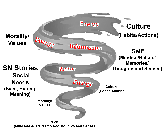



 NEXT
NEXT
 BACK
BACK
 Forum
Forum


Philosophical musings on Quanta & Qualia; Materialism & Spiritualism; Science & Religion; Pragmatism & Idealism, etc.




A philosophical worldview or belief system grounded on the 20th century discovery that Information, rather than Matter, is the fundamental substance of everything in the universe. It is intended to be the 21st century successor to the ancient worldviews of Materialism and Idealism. An Update from Bronze Age to Information Age. It's also a Theory – of – Everything that covers, not just matter & energy, but also Life & Mind & Love.

19. Idealism :
A metaphysical philo-
20. Cosmopsychism :
Phillip Goff quote –
https://aeon.co/essays/cosmopsychism-
21. Universal Mind :
Kastrup imagines the World Mind as-
“He regards reality as the image of a hierarchical structure of mental processes, an evolving ecosystem of minds”.
22. Laws of Life & Mind :
“According to Deacon, the defining property of every living or psychic system is that its causes are conspicuously absent from the system in which they participate. They are causes not present in the material system itself, even though they produce effects in that system”.
https://footnotes2plato.com/2012/05/23/reading-
Post 132. March 10, 2024
How Does the Brain Create Mind?
Cosmopsychism : universal mind embodied in matter
Kastrup’s alternative to ancient Materialism & Panpsychism is similar to the equally antiquated worldview of Idealism¹⁹. His updated version of the all-
I have a few quibbles about terminology. Analytic Idealism sounds like a scientific concept, that reduces reality down to a primordial atom of sentience. But, I prefer Holistic Idealism, to indicate that reality-
I won’t delve into his mind-
End of Blog Post 132



Evolution of Consciousness

Quote :
Philosopher and Psychologist William James on the fundamental nature of Consciousness :



Click for pic

Click for pic
23. Kastrup’s God :
His Cosmic Mind is not viewed as a traditional god, but more as a force of Nature. “Bernardo Kastrup also tells Michael Egnor that he does not think God is self-
https://uncommondescent.com/intelligent-

Science Ideated
The Fall of Matter
Bernardo Kastrup
Computer Engineer & Philosopher
The “hard problem of Consciousness” :
The impossibility of explaining qualities in terms of quantities
